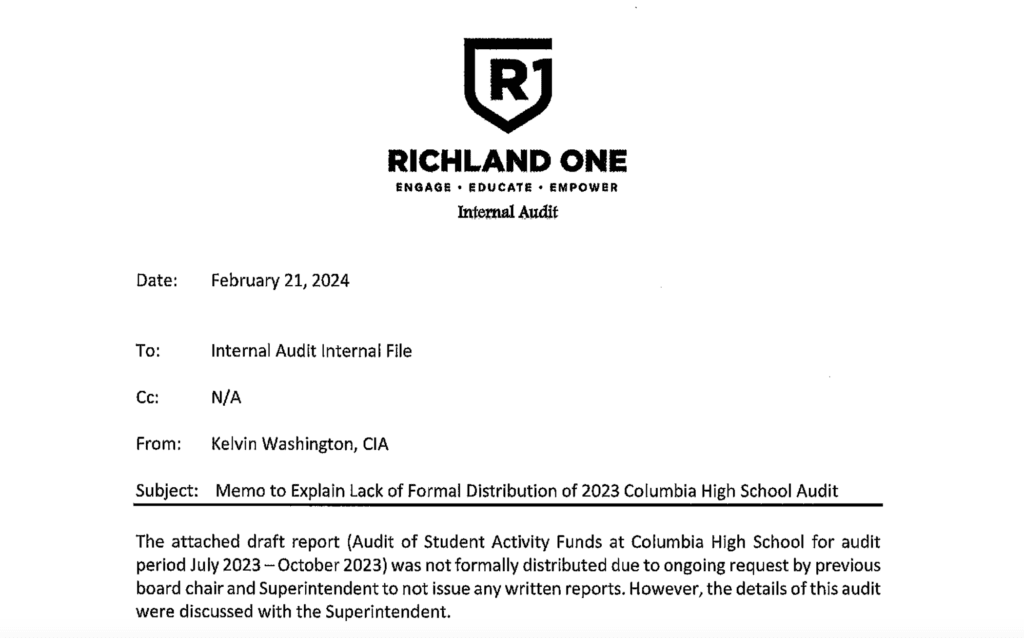A June 3, 2024, meeting of Richland One’s Administration Committee Meeting grew heated when Commissioner Robert Lominack raised questions about a memo from the school board’s internal auditor memorializing an “ongoing request by previous board chair and Superintendent to not issue any written reports.”
That’s right, the school district’s internal auditor, Kelvin Washington, CIA, claims he was instructed by former-Chair Cheryl Harris and Superintendent Craig Witherspoon not to put his findings in writing.
This fact, which you can read for yourself in Washington’s February 21, 2024, Memo to Explain Lack of Formal Distribution of 2023 Columbia High School Audit, prompted Lominack to ask, among other things, why the school board was not told that its auditor was instructed to stop putting things in writing.
You can hear the superintendent’s response for yourself in a 26-minute audio recording excerpt of the meeting with Witherspoon, Lominack, and Commissioner Jamie Devine, in which he denies Washington’s claim. However, the Washington Memo is equivocal as to the reason he was no longer submitting written findings to the school board, including the draft 11-page report about Columbia High School that he never finalized or distributed, “[b]ecause of the request for no formal distribution[.]”
So, what is going on and what does the Washington Memo mean for Richland One and board governance?
The Richland One Auditor
The auditor is one of just three district employees who reports directly to the board. Whereas all other employees like teachers, principals, administrators, etc. report to the superintendent, who in turn reports to the board, the auditor is different. The purpose of this direct report is to ensure the auditor has direct access to the district’s elected fiduciaries who themselves are accountable to the public through elections. Put differently, whereas the board is responsible for overseeing the administration, the auditor aids in that purpose.
Richland One’s administration and some board members have long touted the existence of the auditor position (most school boards do not have such a position) as evidence of sound internal controls. Generally, that’s correct—having an auditor to routinely review district operations should strengthen fiscal controls and management.
A district on fiscal watch
Of course, having an auditor promoting and evaluating internal controls on programs, activities, functions and processes within district departments, including finance, is only a worthwhile endeavor if the district listens and follows his professional advice, something Richland One has not always done with, deleterious impact on the district.
Recall Richland One’s purchasing card or “P-card” scandal, that resulted in the dubious distinction of the district being placed on fiscal watch by the state Department of Education (DOE). P-cards are credit cards used by some governmental entities to streamline purchasing, typically for small-dollar purchases.
In March 2022, the district accused a purchasing employee, Travis Braddy, of misspending more than $41,000 on hotel stays, a vehicle rental, and a no-bid order for COVID-19 supplies. The Braddy incident underscored concerns raised by a parent group claiming $322,000 in P-card use with banned vendors and warnings issued by the district auditor, Washington, the prior year. As the Post and Courier (P&C) reported:
"Some of their findings echo a report by the district’s own internal auditor in August, which found Richland One’s credit cardholders spent freely with vendors that were supposed to be blocked, didn’t document the business justification for their expenses and enjoyed little scrutiny from their supervisors. Internal auditor Kelvin Washington sampled just a sliver of the district’s $2.2 million in P-card spending in 2020 and found about $148,000 in transactions with forbidden vendors — nearly half of it for food and groceries. Washington pointed out nearly $1,500 spent for 60 embroidered coolers, more than $1,000 on flowers, $267 for holiday cards around Thanksgiving, $557 for a Christmas tree and $171 for pet training pads from Walmart."
You can read the auditor’s August 2, 2021, memo on the risks P-cards posed to the district. Needless to say, the auditor’s warning was not heeded.
On December 6, 2022, DOE’s Office of Auditing Services (OAS) found “several instances in which the district did not adhere to its P-Card policies and procedures” and that “the district’s overall review and approval process for P-Card purchases is deficient.” (Read the full report here.) Richland One has been on fiscal watch ever since.
In response to the parent’s group report and the Braddy revelations, then-Chair Harris pushed back hard, claiming she was confident in the district’s checks and balances: “There is no ongoing issue in Richland One.” Instead, Harris told the P&C, “This is Richland One doing their job.”
Auditor told not to do his job
Flash forward to the recent Administration Committee Meeting, Lominack claimed the board had not heard from the auditor in months and cited the Washington Memo as the apparent explanation.
Witherspoon expressed concerns that audit reports subjected the district to public criticism. Of course, that is the purpose of an audit—to exercise some self-criticism in order to improve or prevent waste, fraud, and abuse.
For his part, Devine was unfazed by the fact that a board colleague and the superintendent (i.e., his subordinate) instructed the auditor to stop documenting his findings—findings Devine is entitled to have. Instead of being upset that he was being denied oversight information, Devine was upset Lominack raised the issue in the first place.

This should not be the final word on the matter as many questions are yet to be answered. For example, how can one board member instruct the auditor not to make written findings when he reports to the entire board? Why is the superintendent instructing the auditor at all? Are there other writings, like the unfinished Columbia High report that the auditor was forced to mothball based on the instruction he received?
The Richland One community needs answers and the board would do well to seek them in a public and transparent fashion.

